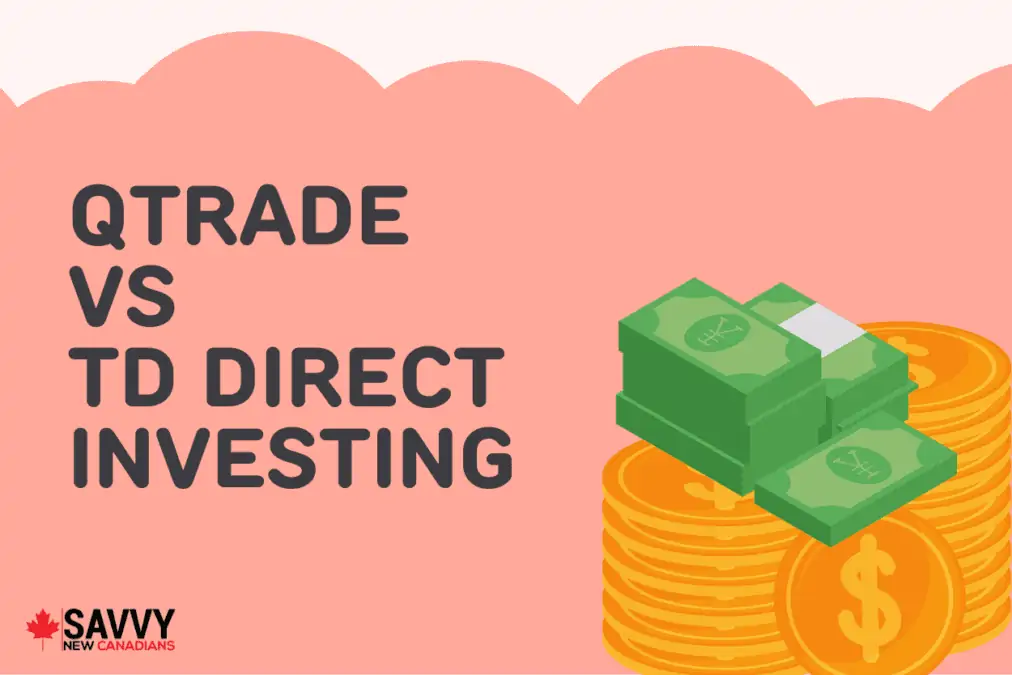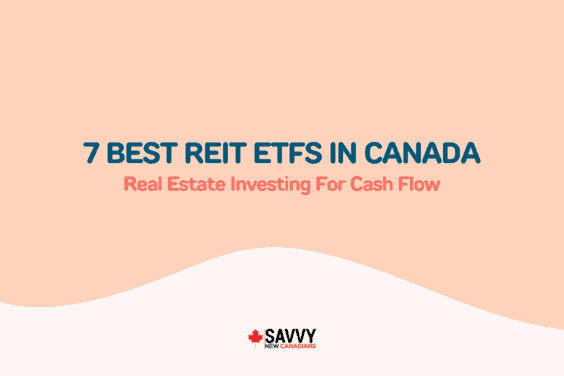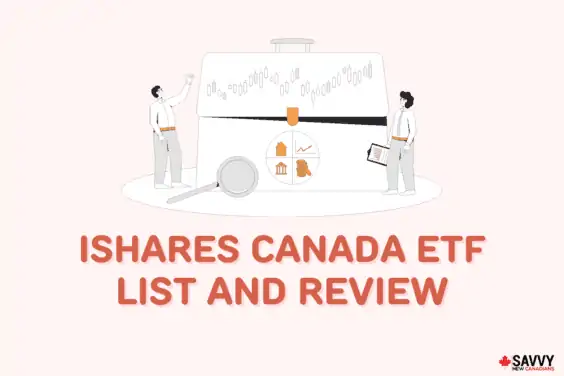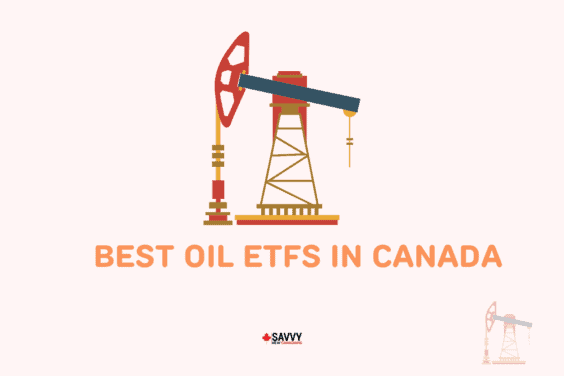Online brokerages enable self-directed investors to own their investment game, slash investment fees, and maximize returns.
They give you the trading tools you need to choose your own market securities and manage/monitor your portfolio independently.
Qtrade and TD Direct Investing are among the best brokerage platforms in Canada for self-directed investors.
While the two stock trading apps are great for DIY investors, they offer different features that you need to be aware of so that you can decide wisely on where to start or continue your investment journey.
To help you choose the one that fits your investment needs, this Qtrade vs TD Direct Investing comparison summarizes their account types, investment products, trading fees, minimum investment, trading platforms, and more.
What is Qtrade?
Qtrade Direct Investing is a top discount broker in Canada based out of Vancouver. It is a division of Credential Qtrade Securities Inc, part of Aviso Wealth.
Aviso Wealth is backed by the Desjardins group and stands out among the largest wealth management companies in Canada providing wealth management services to more than 150 credit unions and financial institutions.
Qtrade has been offering investment services since 2000 and has been ranked as Canada’s #1 online investing platform 25 times in the past 17 years, and the #1 online broker for client service eight times in the past six years.
The platform offers a superior trading experience and is accessible via its web interface or the Qtrade stock trading app.
Qtrade

Up to $150 sign-up bonus
Trade stocks, ETFs, options, bonds, etc.
Excellent platform for newbies and seasoned investors
Competitive trading fees
Excellent customer service
What is TD Direct Investing?
Owned by the Toronto-Dominion Bank, TD Direct Investing is one of the best brokerage platforms in Canada that has been making investing easier for Canadians for over 30 years.
It has existed since 1984 under different names, and for 8 years in a row, it has been ranked the #1 broker for Market Data by MoneySense.
It first went by the name TD Green Line Investor Service but was renamed Web Broker in 1996 to become the first online brokerage platform owned by a bank.
It was later rebranded to Waterhouse Discount Brokerage in 1999 and finally to TD Direct Investing in 2012.
The platform is accessible via its web interface and mobile app and provides both registered and non-registered accounts to allow Canadians to invest in different market securities in Canada and US markets.
Learn more in this TD Direct Investing review.
Qtrade vs TD Direct Investing: Account Types
Both Qtrade and TD Direct Investing offer registered and non-registered accounts so that different investors can choose the investment/savings account that fits their needs.
Registered accounts offered by both platforms include:
- Tax-Free Savings Account (TFSA)
- Registered Retirement Savings Plan (RRSP)
- Registered Education Savings Plan (RESP)
- Registered Retirement Income Fund (RRIF)
- Locked-in Retirement Account (LIRA)
- Life Income Fund (LIF)
- Margin and cash accounts
In addition, TD Direct Investing offers an extra registered account known as the registered disability savings plan (RDSP).
Both platforms also offer non-registered accounts, including investment clubs, trusts, and individual and joint accounts.

Qtrade vs TD Direct Investing: Investing Products
Both Qtrade and TD Direct Investing offer about 7 investment products.
It can be very convenient if all the investment products you want to trade are available on one platform, as you can easily manage your portfolio from one place.
Qtrade offers the following investment products:
- Stocks
- Exchange-Traded funds (ETFs)
- Mutual funds
- Bonds
- Options
- Guaranteed Investment Certificates (GICs)
- New issues
TD Direct Investing offers the following investment products:
- Stocks
- Options
- Exchange-Traded funds (ETFs)
- Mutual funds
- Fixed Income assets
- Precious Metal Certificates
- Term Deposits
Qtrade vs TD Direct Investing: Minimum Investment
Both Qtrade and TD Direct Investment have no minimum investment requirements.
This is great for newbie investors looking to start small and grow their portfolio over time by investing their pocket change.
Qtrade vs TD Direct Investing: No Commission ETFs
Commission-free trading is becoming common in Canada, hence a major factor to consider when choosing the best stock trading apps in Canada.
TD Direct Investing does not offer commission-free ETFs, and you’ll incur the standard trading fee of $9.99 per trade buying and selling ETFs on the platform.
That said, if you sign up via TD Easy Trade, you get 50 commission-free stock trades per year.
Qtrade offers 100+ no-commission ETFs, i.e. you don’t pay a fee when buying or selling these ETFs.
Qtrade vs TD Direct Investing: Trading Fees
Qtrade charges lower trading fees compared to TD Direct Investing
TD Direct investing standard trading fees stand at $9.99 per trade and $7 per trade for active traders.
Qtrade charges a lower standard trading fee of $8.75 per trade and $6.95 for active traders.
Qtrade vs TD Direct Investing: Admin & Other Fees
Both Qtrade and TD Direct investing charge account maintenance fees.
TD Direct Investing account maintenance fees come in as follows:
- $25 maintenance fee per quarter for account balances less than $15,000.
- $100 full RRSP account withdrawal fee
- $25 partial RRSP withdrawal fee
- $150 account transfer out fee
- $2 for each mailed account statement
- $5 for each duplicate statement
Qtrade levies the following account maintenance fees:
- $25 per quarter account administration fees for accounts with balances less than $25k.
- $100 for accounts closed within the first year of account opening
- $150 account transferred out fee
- $15/quarter for US dollar-denominated registered accounts.
- $6 per quarter for paper account statements
- $2.50 per trade for paper trade confirmations
Qtrade vs TD Direct Investing: Trading Platforms
Both Qtrade and TD Direct Investing offer web access and mobile stock trading apps to trade, manage, and track your portfolio’s performance on the go.
TD Direct Investing offers access to four trading platforms, including:
- Web Broker: Offers charting tools, stock screeners, automated alerts, advanced order types, and more.
- TD Mobile App: Helps you trade stocks, ETFs, and options on the go.
- Advanced Dashboard: Offers experienced traders real-time streaming data, advanced charting tools, and options analysis.
- ThinkorSwim: Provides access to customized charting, live news feeds, level II streaming data and more, but requires a minimum balance of $25,000 to activate.
The Qtrade trading platform offers stock screening tools, technical analysis tools, and well-researched fundamentals for various securities. Its top technical analysis tools on the platform include:
- Portfolio creator: Automatically create an ETF portfolio based on your preferences
- Portfolio score: Helps you assess your portfolio’s risk based on several factors.
- Portfolio Simulator: Helps you test your investing ideas and strategy before risking real funds.
Qtrade vs TD Direct Investing: Customer Service
TD Direct Investing offers customer services via telephone and email from Monday to Friday (7 am to 6 pm).
Qtrade offers customer services via email and telephone, and their customer reps are available Monday to Friday from 8:30 am to 8:00 pm ET.
Qtrade vs TD Direct Investing: Security
Both Qtrade and TD Direct Investing are regulated by the Investment Industry Regulatory Organization of Canada (IIROC) and are members of the Canadian Investor Protection Fund (CIPF).
With CIPF membership, your account is protected up to $1M against insolvency.
Both Qtrade and TD Direct Investing also offer online and mobile security guarantees, and you’ll get 100% reimbursement if you suffer loss from fraudulent account activity.
Qtrade vs TD Direct Investing: Promotions
Qtrade currently has a limited-time promotion. You’ll get up to $150 cashback when you open or transfer a new account and fund it. Visit their website to read the complete eligibility details.
As of this writing, TD Direct Investing does not appear to offer any account opening incentives.
You can view other brokerage promotions in Canada.
Qtrade Investor vs TD Direct Investing vs Questrade
The table below shows how Qtrade and TD Direct Investing stack up against Questrade.
| Qtrade | TD Direct Investing | Questrade | |
| Stock trading fees | $8.75 per trade | $9.99 | $9.95 |
| Trading fee discounts | $6.95 active trader fee | $7 active trader fee | $4.95 active trader fee |
| Commission-free ETFs | 100+ free ETFs | No | Free to buy; pay $4.95-$9.95 when you sell |
| Options | $8.75 +$1.25 per contract | $9.99 + $1.25 per contract | $9.95+$1 per contract |
| Account Types | TFSA, RRSP, RESP, LIRA, LIF, margin, corporate accounts | TFSA, RRSP, RESP, RRIF, DPSP, LIRA Margin & cash account | TFSA, RRSP, RESP, RRIF, LIRA, and non-registered accounts. |
| Products | Stocks, bonds, ETFs, options, mutual funds, GICs, and new issues | Stocks, options, ETFs, mutual funds, fixed income assets, precious metal certificates, term deposits | Stocks, bonds, mutual funds, ETFs, GICs, IPOs, Options, International Equities, Precious metals, FX & CFDs. |
| Minimum Investment | None | None | $1,000 |
| Platforms | Web and mobile | Web and mobile | Web, mobile, and desktop |
| Promo Offer | Get up to $150 cashback | N/A | Get $50 in free trade credit when you invest at least $1,000 |
Qtrade vs TD Direct Investing: Conclusion
Both Qtrade and TD Direct Investing are among the best online trading platforms in Canada for self-directed investors.
Qtrade wins out with its lower trading fees, 100+ commission-free ETFs, and attractive account opening promotion.
That said, if options trading is your focus, TD Direct Investing has more trading tools at your disposal.
Related:







